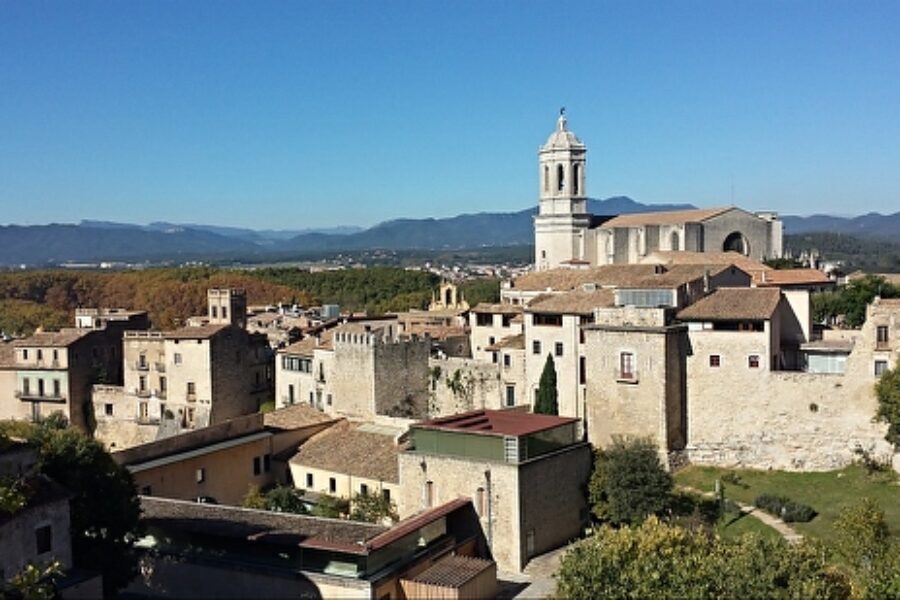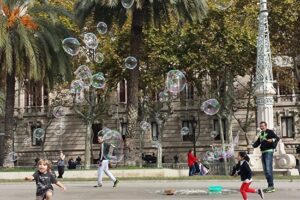Our seats feel familiar, having sat in the same place less than three days ago. The sleek, large-windowed vehicle races north out of Barcelona toward Girona.
It is hard for me to believe that I keep signing up for Explore Catalunya tours, but they are expedient and good and cheaper—and easier—in the long run than renting a car. I do, however, get disappointed when I learn that there will be sixteen individuals on tour, and we will once again be on a small bus. Apparently, tourism in October 2015 is greater than other October’s in years past. I’m just grateful it is not summer. But I remind myself that I planned it that way.
Three of our passengers are from India—a couple with a tiny tot of a little boy who seems frightened of everything. Our tour guide, Veronica, speaks to him matter-of-factly, like an adult to an adult. I think he likes it.
Girona – The Medieval City



Crossing the river into the old town center of Girona, the first thing I notice is that everything is UP. From here. Up. And further up. Climbing the narrow, twisted, steep paths, I tell Michael, “I feel like we are back in Toldeo, but I’m not winded. My legs don’t hurt. I think I’m getting used to this.”



We stop in front of several of the many churches in this small medieval town. There are ninety steps to climb to attain the entrance. Unfortunately, I think I know the plan. Luckily I am wrong. The up is not arrow straight and tortuous, but curling and gradual. We don’t even go to the church.
The Jewish Call in Girona
We arrive at the Jewish quarter, or at least what once was the Jewish Call of Girona. There is little evidence of it today, but still, it is a place to stop and listen to the tale and its telling. Standing in the shadow of high stone walls, not yet at the summit of this ancient town, we are given a history lesson—it is a story of jealousy, greed, blame, and intolerance.
Starting at least a century before Columbus was busy discovering the new world in 1492, but culminating in that year, when Isabella and Ferdinand were signing into decree a document that would ultimately mean the expulsion of all Jewish people from Spain—unless they were willing to put aside their own beliefs and convert to Christianity. Some stayed. Pretending. The need, the greed, the intolerance—saddens and depresses.


Girona’s City Walls
Still, we climb and emerge into a place of light—a garden area in the back of the main cathedral. Some of us sit, some stand, some lean—it has been a heroic effort to reach this place.



Left to our own devices, we walk along the narrow path of the ancient town wall above us. We are like an aberrated seesaw. Going up, just to go down so we can once again climb up. And down. And up…





The Twisted Paths of Girona
Leaving the protection and light and expansive views of this corridor, we make our final descent back into the town, wandering down twisted paths and long stairways. We come to a stone wall and must make a decision. Left—down. Right—up. Michael turns right, of course. We climb, passing a traditionally garbed nun loaded with packages emerging from a doorway. Breathless, she talks to us in Spanish. Michael tells me she said she needs an elevator.



A Coffee Break
I would like just to sit and be. We find an outdoor table at a tiny restaurant on a busy commercial lane and order coffee American. I use two packages of sugar to make the ultra-strong liquid palatable. Happy to just be here, all I really want to do is sit and linger. We watch the clock, not knowing how long it will take for us to return to our meeting point at 1230. Much too soon, we leave, continuing our winding journey through the town to meet our tour guide and continue our excursion on the bus.


Next stop Pals.









Leave a Reply
Your email is safe with us.